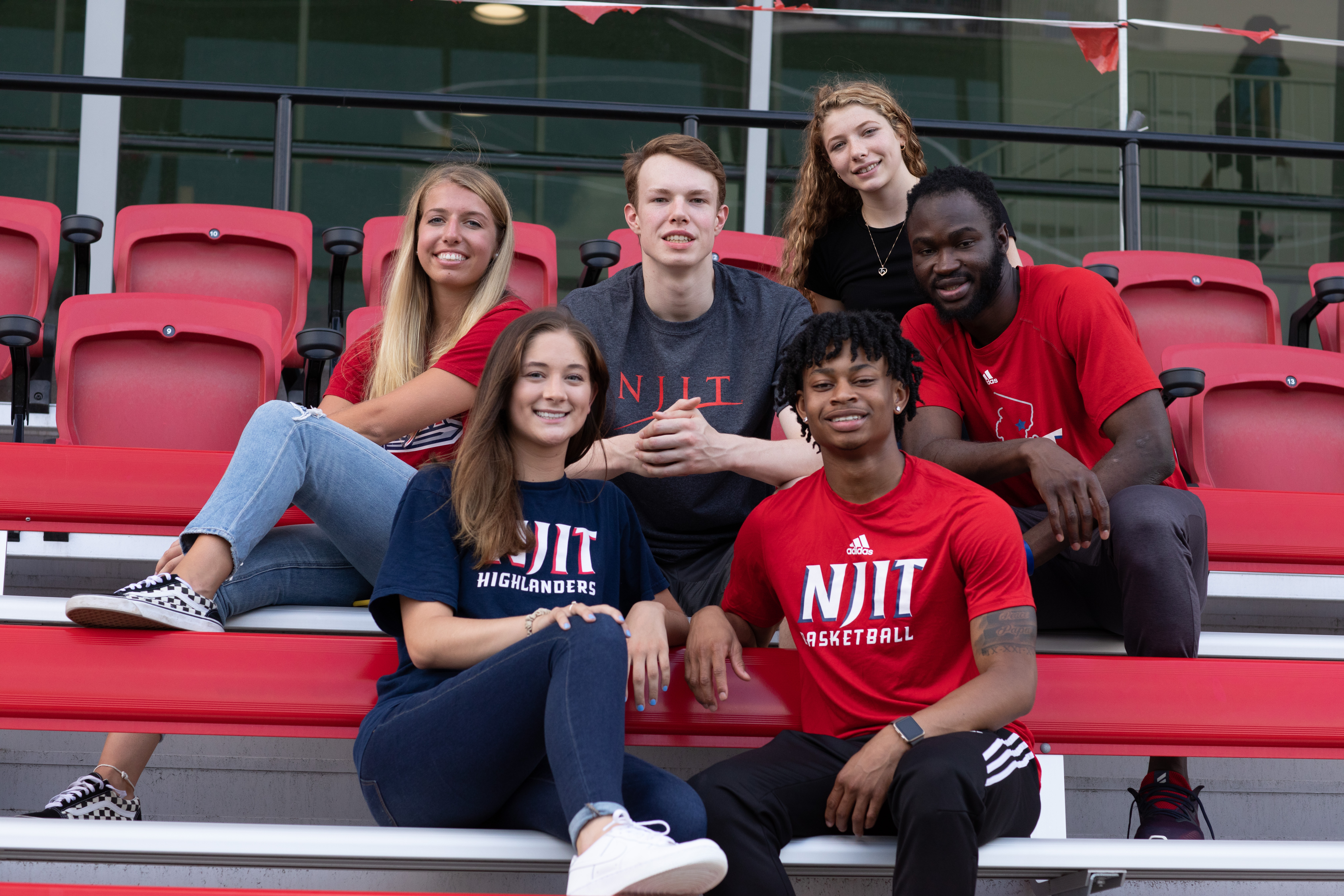First-Year Writing Program
The First-Year Writing Program offered by the Department of Humanities and Social Sciences provides a research and writing foundation for students that enhances their ability to research, think, and write critically. The goal of the program is to prepare students to apply academic and critical perspectives in a dynamic and evolving technological society.
First-Year Writing

The NJIT First-Year Writing Program is designed to address seven specific learning outcomes:
-
Rhetorical Knowledge
Rhetorical knowledge is the ability to analyze contexts and audiences and then to act on that analysis in comprehending and creating texts. Rhetorical knowledge is the basis of composing. Writers develop rhetorical knowledge by negotiating purpose, audience, context, and conventions as they compose a variety of texts for different situations.
-
Critical Thinking, Reading, and Composing
Critical thinking is the ability to analyze, synthesize, interpret, and evaluate ideas, information, situations, and texts. When writers think critically about the materials they use--whether print texts, photographs, data sets, videos, or other materials--they separate assertion from verification, evaluate sources and evidence, recognize and assess underlying assumptions, read across texts for connections and patterns, identify and appraise chains of reasoning, and compose appropriately qualified and developed claims and generalizations. These practices are foundational for advanced academic writing.
-
Processes
Writers use multiple strategies ‒ often known as "composing" processes ‒ to conceptualize, to develop, and to finalize projects. These procedures are seldom linear: a writer may research a topic before drafting, then conduct additional research while revising or after consulting with a colleague. Composing processes are also flexible: successful writers can adapt their composing processes to different contexts and occasions.
-
Knowledge of Conventions
Conventions are the formal rules and informal guidelines that define genres, and in so doing, shape readers’ and writers’ perceptions of correctness or appropriateness. Most obviously, conventions govern such things as mechanics, usage, spelling, and citation practices. But they also influence content, style, organization, graphics, and document design. Conventions arise from a history of use and facilitate reading by invoking common expectations between writers and readers. These expectations are not universal; they vary by genre (conventions for lab notebooks and discussion-board exchanges differ), by discipline (conventional moves in literature reviews in psychology differ from those in English), and by occasion (meeting minutes and executive summaries use different registers). A writer’s grasp of conventions in one context does not mean a firm grasp in another. Successful writers understand, analyze, and negotiate conventions for purpose, audience, and genre, understanding that genres evolve in response to changes in material conditions and composing technologies and they attend carefully to emergent conventions.
-
Writing in Digital Environments
Today, one must constantly adapt to emerging technologies, but these technologies still possess rhetorical dimensions and are often themselves valuable composition tools. Successful writers understand the relationships between rhetorical situations and digital environments, and they are comfortable using such environments in all parts of the writing process.
-
Effective Oral Presentation Skills
In both an academic and professional career, it is important to feel comfortable speaking in front of an audience. A piece of writing is not the same as its oral delivery, and it is important to understand the advantages and constraints of both communication methods.
-
Information Literacy
Information literacy is the ability to know when information is needed, to locate it efficiently regardless of its location, format or medium; to evaluate its relevance, authoritativeness, and validity; to use it to build new knowledge; and to communicate that knowledge.
The first four of these learning outcomes are adapted from the recommendations of the Council of Writing Program Administrators (WPA), a national association of college and university faculty working with and for writing programs across the nation. The final three outcomes ‒ writing in digital environments, oral presentation skills, and information literacy ‒ parallel university-wide learning goals.


ENGL 101: Introduction to Academic Writing
ENGL 101 is an overview of college-level writing. In this course, students are introduced to writing’s rhetorical dimensions and they are asked to consider the purpose, audience, occasion, and genre that are called for in a variety of writing, speaking or visual assignments. The course also focuses on writing processes, asking students to brainstorm topics, to write drafts, and to revise their writing based on reflection and peer feedback. Writing and reading go hand-in-hand, so students are asked to read challenging articles, essays, and prose, and to consider paintings, films, or other visual compositions. Academic writing begins from the assumption that written, visual, and spoken texts can be in conversation with each other. Thus, the readings serve as both models of effective communication and as beginning places for students’ own arguments and analyses.
By completing ENGL 101, students will:• Gain knowledge of the rhetorical dimensions of writing
• Use writing as a tool for critical thinking and reflection
• Practice writing as a process by using various brainstorming, inventing, revising, and editing strategies
• Write in several genres that utilize analysis, reflection, narrative, critique, and argumentative skills
• Practice using the conventions of written, spoken, and visual composition
• Practice writing and creating in digital environments
Prerequisite Skills:
Prerequisite skills for ENGL 101 include proficiency in basic communication
strategies ‒ the knowledge, skills, and attitudes ‒ required at the post-secondary level.
Demonstration of these skills is required for successful completion of ENGL 101
or its equivalent.
Prerequisites: Entrance is determined by placement-test score or completion of ENGL
099 with a grade of C or better.
Next Recommended Courses: ENGL 102
ENGL 102: Introduction to Research Writing
Students engage in a multi-stage inquiry project that leads them through the practices of university-level research that will be central to their success at NJIT and beyond. In addition to practicing research skills by searching for and collecting primary and secondary sources, students practice synthesizing elements of research into coherent wholes. Successful synthesis requires that students understand and interpret their sources and put them in conversation with each other. This work also emphasizes correctly documenting and attributing the sources that are assembled as part of a research project.
By completing ENGL 102, students will:• Explore and refine research questions
• Demonstrate the ability to do problem-based research
• Find, evaluate and choose sources effectively
• Practice writing from primary and secondary research, developing different types of research projects that use fieldwork, library, and online research methods
• Demonstrate knowledge of the conventions of bibliographic citation
• Demonstrate an understanding of intellectual property, plagiarism, and the importance of distinguishing between source material and one’s own work
• Draft, review, and revise multiple versions of a single writing project
Course Prerequisites and Next Recommended General University Requirement
Prerequisites: Completion of ENGL 101 or ENGL 100 with a grade of C or better
Next Recommended Courses: HUM/HIST 200


Transfer Equivalencies
Below you will find an up-to-date list of the current NJ community college courses that transfer to NJIT as ENGL 101 and 102. If you do not see your college listed here below, or if you need your transcripts individually evaluated, please contact hss@njit.edu
| TRANSFER CREDIT COURSE EQUIVALENCIES | NJIT COURSES | ||
| ENGL 101 | ENGL 102 | ||
| COMMUNITY COLLEGES | Atlantic Cape | ENGL 101 | ENGL 102 |
| Bergen | WRT 101 | WRT 201 | |
| Brookdale | ENGL 121 | ENGL 122 | |
| Burlington | ENG 101 | ENG 102 | |
| Camden | ENG 101 | ENG 102 | |
| Cumberland | EN 101 | EN 102 | |
| Essex | ENG 101 | ENG 102 | |
| Gloucester | ENG 101 | ENG 102 | |
| Hudson | ENG 101 | ENG 102 | |
| Mercer | ENG 101 | ENG 102 | |
| Middlesex | ENG 121 | ENG 122 | |
| Morris | ENG 111 | ENG 112 | |
| Ocean | ENGL 151 | ENGL 152 | |
| Passaic | EN 101 | EN 102 | |
| Raritan | ENGL 111 | ENGL 112 | |
| Salem | ENG 101 | ENG 102 | |
| Sussex | ENGL 101 | ENGL 102 | |
| Union | ENG 101 | ENG 102 | |
| Warren | ENG 140 | ENG 141 |
